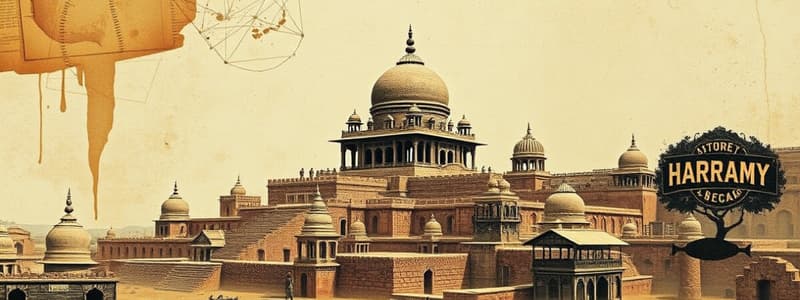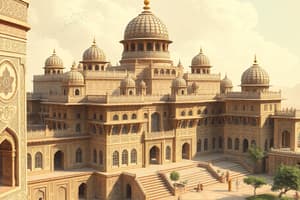Podcast
Questions and Answers
What was the main characteristic of the Theravada branch of Buddhism?
What was the main characteristic of the Theravada branch of Buddhism?
- Emphasis on meditation practices
- Following Buddha's teachings word by word (correct)
- Focus on social activism
- Interpretation of Buddha's teachings
Which of the following statements about Malala's family is accurate?
Which of the following statements about Malala's family is accurate?
- Her grandfather is Rohul Amin, who was known for his military background.
- Malala's father was a government official before opening a school.
- Malala's mother is named Toor Pekai. (correct)
- Malala has only one brother named Khushal.
What impact did General Zia's government have on women's rights in Pakistan?
What impact did General Zia's government have on women's rights in Pakistan?
- It resulted in women being allowed to vote in national elections.
- It led to increased educational opportunities for women.
- It imposed restrictions on women's evidence in court. (correct)
- It abolished all forms of gender discrimination in education.
In which valley did Malala and her family reside?
In which valley did Malala and her family reside?
What was one of the key beliefs expressed in the concept of Jihad as mentioned in Malala's narrative?
What was one of the key beliefs expressed in the concept of Jihad as mentioned in Malala's narrative?
What did the Buddha identify as the source of human suffering?
What did the Buddha identify as the source of human suffering?
What is not one of the Four Noble Truths as taught by the Buddha?
What is not one of the Four Noble Truths as taught by the Buddha?
Which aspect of Hindu beliefs did the Buddha challenge?
Which aspect of Hindu beliefs did the Buddha challenge?
What role did Asoka play in the spread of Buddhism?
What role did Asoka play in the spread of Buddhism?
Which feature was common to both Harappa and Mohenjo Daro in the Harappan civilization?
Which feature was common to both Harappa and Mohenjo Daro in the Harappan civilization?
What does the Eightfold Path primarily emphasize?
What does the Eightfold Path primarily emphasize?
What is the significance of the Ganges river in Hindu beliefs?
What is the significance of the Ganges river in Hindu beliefs?
What did the Buddha believe about personal responsibility in achieving nirvana?
What did the Buddha believe about personal responsibility in achieving nirvana?
Which of the following is one of the components of the Eightfold Path?
Which of the following is one of the components of the Eightfold Path?
What is a fundamental principle of Jainism?
What is a fundamental principle of Jainism?
What was one consequence of the caste system in ancient India?
What was one consequence of the caste system in ancient India?
How did Buddhism empower the common people in society?
How did Buddhism empower the common people in society?
What role did karma play in Hindu beliefs?
What role did karma play in Hindu beliefs?
Why did the Aryans believe their society was stable?
Why did the Aryans believe their society was stable?
What was Siddhartha Gautama's background before he became the Buddha?
What was Siddhartha Gautama's background before he became the Buddha?
What is the main goal of Hindus according to their beliefs?
What is the main goal of Hindus according to their beliefs?
What significant event changed the world for Ziauddin and the community?
What significant event changed the world for Ziauddin and the community?
How did Malala's cousins perceive her?
How did Malala's cousins perceive her?
What is the theme of Small Eid and Big Eid celebrations?
What is the theme of Small Eid and Big Eid celebrations?
What conflict arises in the context of revenge in the community?
What conflict arises in the context of revenge in the community?
What does the author suggest is a consequence of ghost schools?
What does the author suggest is a consequence of ghost schools?
What important lesson did Malala learn from the letter of Abraham Lincoln?
What important lesson did Malala learn from the letter of Abraham Lincoln?
How did the arrival of the Taliban affect women's rights?
How did the arrival of the Taliban affect women's rights?
What made Malala known as the 'genius girl'?
What made Malala known as the 'genius girl'?
What was the stance of the Islamic scholar Mufti regarding girls attending school?
What was the stance of the Islamic scholar Mufti regarding girls attending school?
Which group represents the majority in Pakistan regarding Islamic beliefs?
Which group represents the majority in Pakistan regarding Islamic beliefs?
What was one of the reasons for conflicts between Pakistan and India?
What was one of the reasons for conflicts between Pakistan and India?
How did Musharraf's relationship with Americans change after 9/11?
How did Musharraf's relationship with Americans change after 9/11?
What did the mufti attempt to ban in his delegation's push?
What did the mufti attempt to ban in his delegation's push?
What was the public perception of the earthquake in October 2005, according to certain beliefs among people?
What was the public perception of the earthquake in October 2005, according to certain beliefs among people?
What was a significant outcome of the Taliban's rise concerning women's rights?
What was a significant outcome of the Taliban's rise concerning women's rights?
What characterized the response of society to the persecution of groups during the Second World War?
What characterized the response of society to the persecution of groups during the Second World War?
Flashcards are hidden until you start studying
Study Notes
Ancient India
Harappan Civilization
- Controlled regions along the Indus River, with major cities Harappa and Mohenjo Daro.
- Established trade links with southern India and Mesopotamia.
- Created the first writing system in India.
- Cities were fortified, featuring towering structures.
- Developed advanced sewer systems to prevent flooding.
- Incorporated plumbing in multiple buildings.
Aryan Migration
- Occurred post-Harappan civilization collapse, characterized by the emergence of Aryans.
- Introduced religious texts known as the Vedas.
- Governance led by rajas, local leaders.
- Early Aryans lacked literacy; Sanskrit emerged as a significant language.
Caste Rules
- Social structure prohibited inter-caste interactions, including marriage and dining.
- Non-compliance resulted in social banishment, creating untouchables.
- The caste system provided societal stability within Hindu beliefs.
Life and Rebirth in Hinduism
- Belief in an individual soul or atman residing in everyone.
- Ultimate spiritual goal: reuniting with Brahman.
- Concepts of reincarnation guided by karma, the impact of actions on one's soul.
- Good karma leads to higher existence; bad karma results in a lower caste.
- Dharma involves accepting one's societal role.
Sacred Ganges
- Pilgrimages to sacred sites, particularly the Ganges River, believed to enhance karma.
- Revered as "Mother Ganga," originating from the Himalayas.
- Bathing in the Ganges purifies believers.
Women in Hinduism
- Both genders can achieve spiritual salvation.
- However, women were often considered subordinate to men.
Jainism
- Founded on the teachings of Mahavira, opposing Hinduism.
- Principles include non-violence, truthfulness, abstaining from theft, and renouncing property.
- Adopts a strict vegetarianism and rejects animal sacrifice.
Buddhism
Siddhartha Gautama
- Born a prince in the Kshatriya class, he was sheltered from suffering until adulthood.
- After witnessing human suffering, he sought answers through a spiritual journey.
- Achieved enlightenment after extensive meditation under the tree in Gaya.
Teachings of Buddhism
- Reflected some Hindu ideas; emphasized morality and compassion.
- Introduced the Four Noble Truths, identifying the nature of suffering and the path to overcoming it.
Four Noble Truths
- Accept that suffering is inherent in human existence.
- Recognize that desire for pleasure leads to suffering.
- Acknowledge the possibility of overcoming ignorance and desire to attain nirvana.
- Follow the Eightfold Path as a methodology to achieve liberation.
The Eightfold Path
- Right Thought, Intent, Speech, Action, Livelihood, Effort, Mindfulness, and Concentration are essential for spiritual growth.
Challenges to Hinduism
- Buddha criticized the necessity of rituals for achieving nirvana.
- Advocated for personal responsibility in the search for spiritual enlightenment.
- Opposed the caste system, fostering widespread support, including from affluent individuals.
Spread of Buddhism
- By two centuries after Buddha's death, Buddhism permeated much of India.
- Asoka, a prominent king, converted to Buddhism and promoted its teachings through temples and missions.
- Buddhism diversified into two main branches: Theravada and Mahayana, with Mahayana being the more prevalent today.
Malala
Chapter 1
- Malala's father: Ziauddin, and her name honors Afghan heroine Malalai of Maiwand.
- Originated from the Yousafzai tribe in Mingora, Swat Valley, with younger brothers Khushal and Atal.
Chapter 2
- Grandfather Rohul Amin, influential in speeches, reflects family values.
- Ziauddin faced challenges with stuttering; prioritized education amidst restrictive societal norms for women.
- Context of political dynamics in Pakistan influenced by wars and external events.
Chapter 3
- Ziauddin emphasized education as crucial for societal development.
- The impact of political turmoil and international events on education access for women.
Chapter 4
- Cultural and familial practices surrounding childbirth and celebrations, illustrating societal views on women.
- Malala's early joy and emerging identity in a patriarchal society affected by Taliban influence.
Chapter 5
- Malala gained recognition as an academic achiever amidst rivalry in school.
- Discussion of educational rights and standards, along with cultural pressures regarding honor and revenge.
Chapter 6
- Malala's aspirations intertwined with societal constraints and expectations.
- Discussions around educational inequality and the impact of political interventions post-9/11.
Chapter 7
- Opposition to female education came from conservative religious figures like the Mufti.
- The escalating influence of the Taliban and conflicts rooted in religious ideology.
Chapter 8
- The 2005 earthquake highlighted inadequacies in disaster response and the ensuing hardship.
- Child welfare initiatives contrasted with the government's inefficiency in crisis management.
Chapter 9
- Content discussed was lost, indicates a strong narrative focus on challenges faced in education and gender rights.
Chapter 10
- Content specifics needed for tailored notes, themes likely continue the discussion on educational struggles.
Chapter 11
- Reflection on historical contexts (e.g., Holocaust, WWII) emphasizes the importance of advocacy against injustices, paralleling Malala's fight for women's rights.
- Critique of societal silence in the face of oppression resonates with her narrative on education rights under Taliban control.
Studying That Suits You
Use AI to generate personalized quizzes and flashcards to suit your learning preferences.




